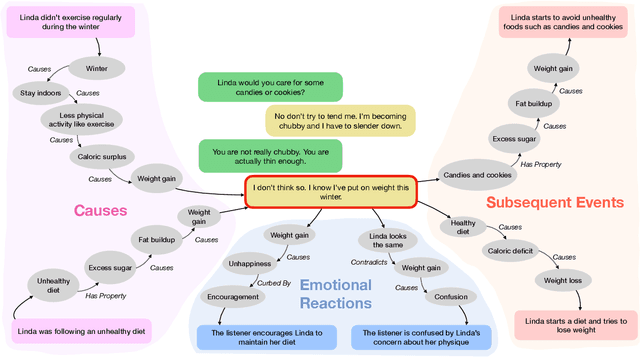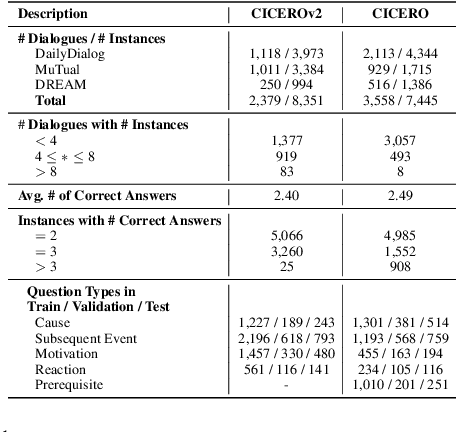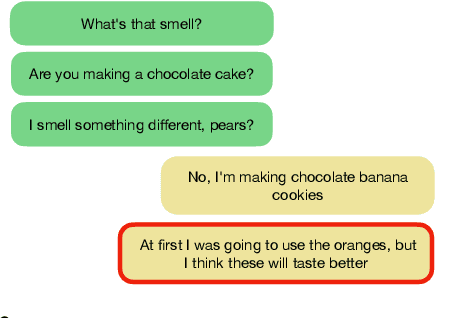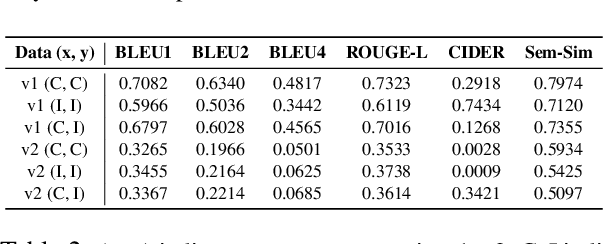Soujanya Poria
Text-to-Audio Generation using Instruction-Tuned LLM and Latent Diffusion Model
Apr 24, 2023Abstract:The immense scale of the recent large language models (LLM) allows many interesting properties, such as, instruction- and chain-of-thought-based fine-tuning, that has significantly improved zero- and few-shot performance in many natural language processing (NLP) tasks. Inspired by such successes, we adopt such an instruction-tuned LLM Flan-T5 as the text encoder for text-to-audio (TTA) generation -- a task where the goal is to generate an audio from its textual description. The prior works on TTA either pre-trained a joint text-audio encoder or used a non-instruction-tuned model, such as, T5. Consequently, our latent diffusion model (LDM)-based approach TANGO outperforms the state-of-the-art AudioLDM on most metrics and stays comparable on the rest on AudioCaps test set, despite training the LDM on a 63 times smaller dataset and keeping the text encoder frozen. This improvement might also be attributed to the adoption of audio pressure level-based sound mixing for training set augmentation, whereas the prior methods take a random mix.
LLM-Adapters: An Adapter Family for Parameter-Efficient Fine-Tuning of Large Language Models
Apr 04, 2023Abstract:The success of large language models (LLMs), like GPT-3 and ChatGPT, has led to the development of numerous cost-effective and accessible alternatives that are created by fine-tuning open-access LLMs with task-specific data (e.g., ChatDoctor) or instruction data (e.g., Alpaca). Among the various fine-tuning methods, adapter-based parameter-efficient fine-tuning (PEFT) is undoubtedly one of the most attractive topics, as it only requires fine-tuning a few external parameters instead of the entire LLMs while achieving comparable or even better performance. To enable further research on PEFT methods of LLMs, this paper presents LLM-Adapters, an easy-to-use framework that integrates various adapters into LLMs and can execute these adapter-based PEFT methods of LLMs for different tasks. The framework includes state-of-the-art open-access LLMs such as LLaMA, BLOOM, OPT, and GPT-J, as well as widely used adapters such as Series adapter, Parallel adapter, and LoRA. The framework is designed to be research-friendly, efficient, modular, and extendable, allowing the integration of new adapters and the evaluation of them with new and larger-scale LLMs. Furthermore, to evaluate the effectiveness of adapters in LLMs-Adapters, we conduct experiments on six math reasoning datasets. The results demonstrate that using adapter-based PEFT in smaller-scale LLMs (7B) with few extra trainable parameters yields comparable, and in some cases superior, performance to that of powerful LLMs (175B) in zero-shot inference on simple math reasoning datasets. Overall, we provide a promising framework for fine-tuning large LLMs on downstream tasks. We believe the proposed LLMs-Adapters will advance adapter-based PEFT research, facilitate the deployment of research pipelines, and enable practical applications to real-world systems.
Evaluating Parameter-Efficient Transfer Learning Approaches on SURE Benchmark for Speech Understanding
Mar 02, 2023Abstract:Fine-tuning is widely used as the default algorithm for transfer learning from pre-trained models. Parameter inefficiency can however arise when, during transfer learning, all the parameters of a large pre-trained model need to be updated for individual downstream tasks. As the number of parameters grows, fine-tuning is prone to overfitting and catastrophic forgetting. In addition, full fine-tuning can become prohibitively expensive when the model is used for many tasks. To mitigate this issue, parameter-efficient transfer learning algorithms, such as adapters and prefix tuning, have been proposed as a way to introduce a few trainable parameters that can be plugged into large pre-trained language models such as BERT, and HuBERT. In this paper, we introduce the Speech UndeRstanding Evaluation (SURE) benchmark for parameter-efficient learning for various speech-processing tasks. Additionally, we introduce a new adapter, ConvAdapter, based on 1D convolution. We show that ConvAdapter outperforms the standard adapters while showing comparable performance against prefix tuning and LoRA with only 0.94% of trainable parameters on some of the task in SURE. We further explore the effectiveness of parameter efficient transfer learning for speech synthesis task such as Text-to-Speech (TTS).
UDApter -- Efficient Domain Adaptation Using Adapters
Feb 16, 2023Abstract:We propose two methods to make unsupervised domain adaptation (UDA) more parameter efficient using adapters, small bottleneck layers interspersed with every layer of the large-scale pre-trained language model (PLM). The first method deconstructs UDA into a two-step process: first by adding a domain adapter to learn domain-invariant information and then by adding a task adapter that uses domain-invariant information to learn task representations in the source domain. The second method jointly learns a supervised classifier while reducing the divergence measure. Compared to strong baselines, our simple methods perform well in natural language inference (MNLI) and the cross-domain sentiment classification task. We even outperform unsupervised domain adaptation methods such as DANN and DSN in sentiment classification, and we are within 0.85% F1 for natural language inference task, by fine-tuning only a fraction of the full model parameters. We release our code at https://github.com/declare-lab/domadapter
A Dataset for Hyper-Relational Extraction and a Cube-Filling Approach
Nov 18, 2022Abstract:Relation extraction has the potential for large-scale knowledge graph construction, but current methods do not consider the qualifier attributes for each relation triplet, such as time, quantity or location. The qualifiers form hyper-relational facts which better capture the rich and complex knowledge graph structure. For example, the relation triplet (Leonard Parker, Educated At, Harvard University) can be factually enriched by including the qualifier (End Time, 1967). Hence, we propose the task of hyper-relational extraction to extract more specific and complete facts from text. To support the task, we construct HyperRED, a large-scale and general-purpose dataset. Existing models cannot perform hyper-relational extraction as it requires a model to consider the interaction between three entities. Hence, we propose CubeRE, a cube-filling model inspired by table-filling approaches and explicitly considers the interaction between relation triplets and qualifiers. To improve model scalability and reduce negative class imbalance, we further propose a cube-pruning method. Our experiments show that CubeRE outperforms strong baselines and reveal possible directions for future research. Our code and data are available at github.com/declare-lab/HyperRED.
Few-shot Multimodal Sentiment Analysis based on Multimodal Probabilistic Fusion Prompts
Nov 12, 2022



Abstract:Multimodal sentiment analysis is a trending topic with the explosion of multimodal content on the web. Present studies in multimodal sentiment analysis rely on large-scale supervised data. Collating supervised data is time-consuming and labor-intensive. As such, it is essential to investigate the problem of few-shot multimodal sentiment analysis. Previous works in few-shot models generally use language model prompts, which can improve performance in low-resource settings. However, the textual prompt ignores the information from other modalities. We propose Multimodal Probabilistic Fusion Prompts, which can provide diverse cues for multimodal sentiment detection. We first design a unified multimodal prompt to reduce the discrepancy in different modal prompts. To improve the robustness of our model, we then leverage multiple diverse prompts for each input and propose a probabilistic method to fuse the output predictions. Extensive experiments conducted on three datasets confirm the effectiveness of our approach.
Two is Better than Many? Binary Classification as an Effective Approach to Multi-Choice Question Answering
Oct 29, 2022Abstract:We propose a simple refactoring of multi-choice question answering (MCQA) tasks as a series of binary classifications. The MCQA task is generally performed by scoring each (question, answer) pair normalized over all the pairs, and then selecting the answer from the pair that yield the highest score. For n answer choices, this is equivalent to an n-class classification setup where only one class (true answer) is correct. We instead show that classifying (question, true answer) as positive instances and (question, false answer) as negative instances is significantly more effective across various models and datasets. We show the efficacy of our proposed approach in different tasks -- abductive reasoning, commonsense question answering, science question answering, and sentence completion. Our DeBERTa binary classification model reaches the top or close to the top performance on public leaderboards for these tasks. The source code of the proposed approach is available at https://github.com/declare-lab/TEAM.
SAT: Improving Semi-Supervised Text Classification with Simple Instance-Adaptive Self-Training
Oct 23, 2022Abstract:Self-training methods have been explored in recent years and have exhibited great performance in improving semi-supervised learning. This work presents a Simple instance-Adaptive self-Training method (SAT) for semi-supervised text classification. SAT first generates two augmented views for each unlabeled data and then trains a meta-learner to automatically identify the relative strength of augmentations based on the similarity between the original view and the augmented views. The weakly-augmented view is fed to the model to produce a pseudo-label and the strongly-augmented view is used to train the model to predict the same pseudo-label. We conducted extensive experiments and analyses on three text classification datasets and found that with varying sizes of labeled training data, SAT consistently shows competitive performance compared to existing semi-supervised learning methods. Our code can be found at \url{https://github.com/declare-lab/SAT.git}.
MM-Align: Learning Optimal Transport-based Alignment Dynamics for Fast and Accurate Inference on Missing Modality Sequences
Oct 23, 2022Abstract:Existing multimodal tasks mostly target at the complete input modality setting, i.e., each modality is either complete or completely missing in both training and test sets. However, the randomly missing situations have still been underexplored. In this paper, we present a novel approach named MM-Align to address the missing-modality inference problem. Concretely, we propose 1) an alignment dynamics learning module based on the theory of optimal transport (OT) for indirect missing data imputation; 2) a denoising training algorithm to simultaneously enhance the imputation results and backbone network performance. Compared with previous methods which devote to reconstructing the missing inputs, MM-Align learns to capture and imitate the alignment dynamics between modality sequences. Results of comprehensive experiments on three datasets covering two multimodal tasks empirically demonstrate that our method can perform more accurate and faster inference and relieve overfitting under various missing conditions.
Multiview Contextual Commonsense Inference: A New Dataset and Task
Oct 06, 2022



Abstract:Contextual commonsense inference is the task of generating various types of explanations around the events in a dyadic dialogue, including cause, motivation, emotional reaction, and others. Producing a coherent and non-trivial explanation requires awareness of the dialogue's structure and of how an event is grounded in the context. In this work, we create CICEROv2, a dataset consisting of 8,351 instances from 2,379 dialogues, containing multiple human-written answers for each contextual commonsense inference question, representing a type of explanation on cause, subsequent event, motivation, and emotional reaction. We show that the inferences in CICEROv2 are more semantically diverse than other contextual commonsense inference datasets. To solve the inference task, we propose a collection of pre-training objectives, including concept denoising and utterance sorting to prepare a pre-trained model for the downstream contextual commonsense inference task. Our results show that the proposed pre-training objectives are effective at adapting the pre-trained T5-Large model for the contextual commonsense inference task.
 Add to Chrome
Add to Chrome Add to Firefox
Add to Firefox Add to Edge
Add to Edge